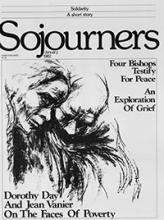Solidarity. The name itself inspires hope. Hope is certainly the best word to describe the feelings of many as we have watched, over these many months, the growth of a people's movement in Poland. Solidarity is a union. It is ironic but not surprising that a union should present this communist state with its most serious challenge. The best unions, like the best churches, are always a challenge to their governments. In fact, when unions and churches no longer pose threats to illegitimate power, or begin to wield that power themselves, something is wrong.
But something was right in Poland, and it sent shock waves of inspiration around the world. Who would dare oppose the Polish state with its rigid bureaucracy, huge military, and strict party line in the shadow of the Russian giant towering at the border?
But Goliath met David, and his name was Solidarity. Starting with ordinary people, the urban workers first and then the farmers, the union grew as fast as the aspirations of the Polish people for human dignity, a better life, and the right to participate in the decisions that affected them.
It's an old story. Try as they might, governments can never quite keep down the spirit of freedom, at least not forever. Poland's time had come.
The Roman Catholic Church in Poland had been the most independent force in the country powerful influence in the lives of the people. It stood as a buffer between the state and the people, serving as their advocate and defender.
Read the Full Article

